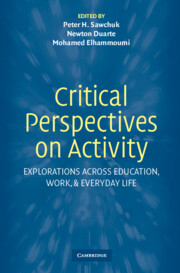Book contents
- Frontmatter
- Contents
- List of Contributors
- Foreword by Seth Chaiklin
- Acknowledgements
- 1 Introduction: Exploring Activity Across Education, Work, and Everyday Life
- SECTION I CRITICAL PERSPECTIVES ON THEORY
- SECTION II EDUCATION
- SECTION III WORK
- 8 Contradictory Class Relations in Work and Learning: Some Resources for Hope
- 9 From Labor Process to Activity Theory
- 10 Values, Rubbish, and Workplace Learning
- SECTION IV EVERYDAY LIFE
- References
- Index
10 - Values, Rubbish, and Workplace Learning
Published online by Cambridge University Press: 10 December 2009
- Frontmatter
- Contents
- List of Contributors
- Foreword by Seth Chaiklin
- Acknowledgements
- 1 Introduction: Exploring Activity Across Education, Work, and Everyday Life
- SECTION I CRITICAL PERSPECTIVES ON THEORY
- SECTION II EDUCATION
- SECTION III WORK
- 8 Contradictory Class Relations in Work and Learning: Some Resources for Hope
- 9 From Labor Process to Activity Theory
- 10 Values, Rubbish, and Workplace Learning
- SECTION IV EVERYDAY LIFE
- References
- Index
Summary
THE VALUE DILEMMA
In psychology and education, values are usually understood as personal preferences or subjective orientations toward the world. In other words, values are firmly located inside the individual subject's mind. Although this may correspond to much of our everyday experience, there is also a very different, if not diametrically opposite, way of locating value. This alternative way is illustrated by a bitter letter to the editor, signed by the pseudonym ‘A long-term unemployed with three degrees’, recently published in the leading Finnish newspaper Helsingin Sanomat.
I would like to finally utilize the education I have received and the experience I have collected through my life, but for both public and private sector employers, my value in the labor market seems to be full zero [italics added].
The author of these lines talks about his or her value in the labor market. In other words, the value is primarily in the object – in this case, in the person trying to sell his or her labor power in the market. There is still a subjective element involved, namely, the fact that the value of the object is assessed by the employers. But value is definitely not just a personal preference or subjective orientation of an employer; it is something more objective and societal.
In both profit-oriented management guidebooks and critical studies of organizations, work-related values are typically treated as mental and textual constructs of ideology, used primarily for purposes of motivating employees, gaining their commitment, or achieving control.
- Type
- Chapter
- Information
- Critical Perspectives on ActivityExplorations Across Education, Work, and Everyday Life, pp. 193 - 208Publisher: Cambridge University PressPrint publication year: 2006
- 3
- Cited by



